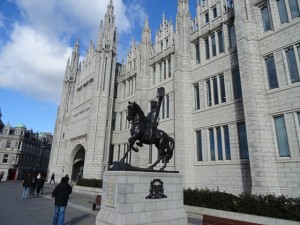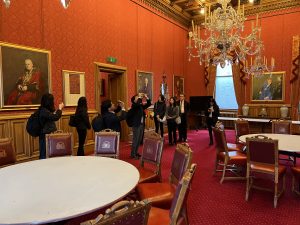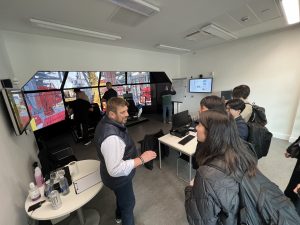
Robert the Bruce Statue outside Marischal College Broad Street in Aberdeen
As part of the on-the-job training for staff seconded from Japan, a visit was organised to Aberdeen to learn about the council’s approaches to local issues, and to visit the Robert Gordon University hosting the “Kobe City Scotland Summer Program,” a collaborative project between the City of Kobe and Robert Gordon University.
History of Exchange between Japan and Aberdeen
The first stop was the Aberdeen Maritime Museum, where we visited the Japan-related exhibits including one on Thomas Blake Glover (1838-1911) who contributed to the development of Japan as an industrial nation in the late 19th century. Glover worked for the Scottish trading company Jardine Matheson, moving to Nagasaki in 1859 after which he spent the rest of his life in Japan.
Glover contributed to industrialising Japan and modernising the Japanese way of life by importing ships and weapons for the Japanese government and helping to found the Kirin Beer company, one of Japan’s best-known brands.
A model of the “Josho Maru,” one of the ships he had built, is on display here.
Glover’s dedication and willingness to risk his reputation and his life for Japan earned him the nickname “Scottish Samurai” and the residence where Glover spent his life remains in Nagasaki, Japan, and since 2010, the cities of Aberdeen and Nagasaki have partnered as Civic Friendship Cities.
Aberdeen City Council

Aberdeen Town House
After a welcome speech by Deputy Lord Provost Steve Delaney, the officials of each department spoke on the elections, anti-poverty actions, and the city’s efforts to introduce the hydrogen economy. The tour also included a tour of the Town House, a historic building near the City Council.
The city’s particularly progressive hydrogen strategy started in 2015 and outlines essential action needed over the next ten years to ensure the city becomes a world-class energy hub leading the low-carbon economy and at the forefront of hydrogen technology.
By positioning the city as a centre for hydrogen technology and leveraging the North East of Scotland’s expertise in oil and gas and its outstanding capacity for renewable energy generation, the city is working to introduce the hydrogen economy to the region and promote hydrogen technology.
Aberdeen, through the work of the council, has become a hub of hydrogen activity with two hydrogen stations (Kittybrewster and ACHES) and one of the largest and most diverse fleets of hydrogen vehicles in Europe, including buses, cars, vans, road sweepers and waste trucks. It is also the site of the world’s first deployment of Wright Bus’ fuel cell double-decker buses.
We had the opportunity to ride the bus during our stay and found it very quiet and comfortable.
Through its ongoing hydrogen promotion efforts, the city is promoting opportunities for more near-term growth in the region, including public, private, and third-sector collaboration to maximise local benefits while also looking toward the long-term goal of industry diversification.
On energy, the city has signed MOUs with Muroran City in Hokkaido and Kobe City in Hyogo Prefecture, respectively.
The City of Muroran and the City of Kobe have agreed to collaborate and cooperate to commercialise the hydrogen energy industry and study the feasibility of industrial development through the import and export of hydrogen. In 2022, Aberdeen helped organise an online symposium with Muroran City.
Kobe City, one of these ‘H2 Twin Cities’, has also signed an MOU on marine industries and human resource development, and both cities aim to achieve carbon neutrality by 2050 by sharing knowledge and information.
Robert Gordon University (RGU)

Oil platform simulator at RGU
RGU is a large university located about 20 minutes by bus from the city centre, with 17,000 students from 149 countries. The high-quality curriculum provides students with the skills they need to succeed in their careers, and in the National Student Survey’s student satisfaction survey, RGU is in the top three in Scotland and the top 10 in the UK.
The university has 11 schools offering more than 300 courses in engineering, computing, architecture, life sciences, health care, social work, and business, with a strong focus on online learning. Those courses are offered through close partnerships with industry and other organisations, providing skills that meet national and regional needs. In addition, about two-thirds of the students are currently studying on campus and one-third online or at partner institutions abroad.
RGU has close ties to industry and a significant track record in developing human resources domestically and internationally, working with organisations, governments, industry associations, and educational institutions to promote innovation and economic development. Students take advantage of the university’s relationship with industry to study while being involved with companies, and working people also learn while being in the companies. The courses allow students to obtain the knowledge, skills, and degrees they want while in employment, in a manner appropriate to their circumstances.
RGU, named after Robert Gordon, a social entrepreneur and philanthropist, has been working to improve entrepreneurship and innovation, and in the past five years have been organising a specialised team to engage intensively in various projects. RGU has won the “Entrepreneur University of the Year” award twice in the last three years from THE World Universities Insights Limited’s “The Awards” programme.
The “Startup Accelerator” and the “UN SDGs Student Idea Contest” are two specific initiatives the company is involved in.
The Startup Accelerator program invites start-up ideas from students, graduates, and university staff and supports the commercialising ideas that pass the screening process. Proposals which pass the screening process, the programme provides opportunities for external publicity to obtain financial support, tutoring by experts, and matching services with companies looking for startups. It is still rare for a university to implement such a project, and this is one of the leading initiatives in Scotland.
The “UN SDG Student Idea Contest” awards and funds the best innovative ideas linked to any of the 17 SDG targets. This programme, launched on a pilot basis last year, selects one winner and two good ideas once a month. Successful bidders wishing to start new ventures can join the “Startup Accelerator” programme described above.
In addition to the above, the program also offers an online startup support program for women raising children in the Aberdeen area, promoting collaboration with students and residents.
Throughout the visit, we were impressed by the many projects involving current students, the alumni community and local people. RGU is open to local residents, and the course system makes it easy for working people to acquire the skills, knowledge, and degrees they need, a startup idea project that also targets graduates, entrepreneurial support for residents, etc. This allows students to gain practical skills and residents to enjoy the benefits of having a university. Students learn about local issues as the local community benefits from the university’s presence.
Reflecting on the visit
During this visit, we learned that the City of Aberdeen and RGU are cooperating in multiple areas to promote their projects in a rapidly changing society, identifying the needs of local residents. RGU and the city council share and collaborate with local businesses to accurately solve and improve issues quickly, which will support the lives of residents.
JLGC would like to thank our Aberdeen City Council and Robert Gordon University hosts for the warm welcome and valuable learning opportunity.

